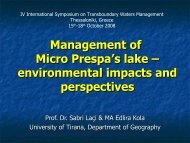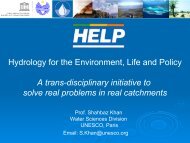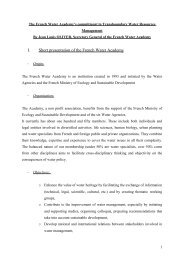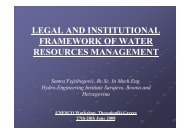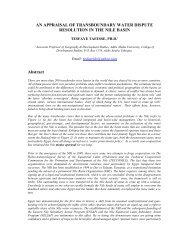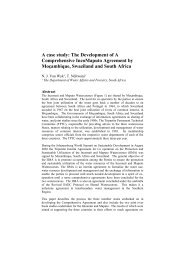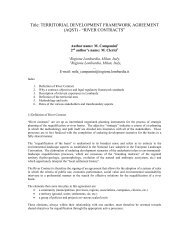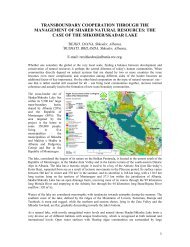iv simposio internacional sobre el karst málaga 2010, spain ... - inweb
iv simposio internacional sobre el karst málaga 2010, spain ... - inweb
iv simposio internacional sobre el karst málaga 2010, spain ... - inweb
Create successful ePaper yourself
Turn your PDF publications into a flip-book with our unique Google optimized e-Paper software.
Objet<strong>iv</strong>os<br />
Object<strong>iv</strong>es<br />
Los <strong>simposio</strong>s <strong>sobre</strong> <strong>karst</strong> que se han venido c<strong>el</strong>ebrando periódicamente<br />
en Málaga (España), desde <strong>el</strong> año 1992, pretenden ser un foro <strong>internacional</strong><br />
de debate científico <strong>sobre</strong> los avances producidos en la investigación<br />
de este tipo de medios. En esta convocatoria, <strong>el</strong> IV Simposio<br />
Internacional <strong>sobre</strong> Karst (SIKA-<strong>2010</strong>) tiene como objet<strong>iv</strong>o principal debatir<br />
y dar a conocer las últimas tendencias de investigación en materia de<br />
Acuíferos Kársticos y Recursos Hídricos, a partir de resultados obtenidos<br />
con diferentes metodologías en distintas áreas kársticas d<strong>el</strong> mundo.<br />
The symposia on <strong>karst</strong> that have been h<strong>el</strong>d periodically in Malaga (Spain)<br />
since 1992 are intended to be an international forum for scientific debate on<br />
the progress made in research into <strong>karst</strong> environments. At this fourth event,<br />
the main object<strong>iv</strong>e of the 4th International Symposium on Karst (ISKA-<strong>2010</strong>)<br />
is to discuss and disseminate the latest trends in research into <strong>karst</strong> aquifers<br />
and water resources on the basis of the results obtained with different<br />
methodologies in various <strong>karst</strong> areas in the world.<br />
Temática<br />
Topics<br />
Los temas que se proponen desarrollar en <strong>el</strong> marco de este <strong>simposio</strong> se<br />
describen a continuación.<br />
- El agua y <strong>el</strong> <strong>karst</strong>: hidrogeología kárstica, agua en la zona no saturada, investigación<br />
y protección de recursos hídricos en <strong>el</strong> <strong>karst</strong>.<br />
- Karst y patrimonio natural: mod<strong>el</strong>ado kárstico, ecosistemas kársticos, importancia<br />
d<strong>el</strong> agua subterránea en <strong>el</strong> medio ambiente.<br />
- Ingeniería Geológica: obras de infraestructura (tún<strong>el</strong>es, presas), almacenamiento<br />
de CO 2 y otros.<br />
- R<strong>el</strong>ación entre <strong>el</strong> hombre y <strong>el</strong> <strong>karst</strong>: turismo y <strong>karst</strong>, cuevas turísticas, impactos<br />
ambientales y riesgos asociados en <strong>el</strong> <strong>karst</strong>.<br />
The following themes are to be addressed in the framework of this<br />
Symposium:<br />
- Water and <strong>karst</strong>: <strong>karst</strong> hydrogeology, water in the unsaturated zone, investigation<br />
and protection of water resources in <strong>karst</strong>.<br />
- Karst and natural heritage: <strong>karst</strong> landscape, <strong>karst</strong> ecosystems, importance of<br />
groundwater in the environment.<br />
- Engineering Geology and <strong>karst</strong> aquifers: large structures (tunn<strong>el</strong>s, dams),<br />
storage of CO 2<br />
and others.<br />
- R<strong>el</strong>ationship between humans and <strong>karst</strong>: tourism and <strong>karst</strong>, caves frequented<br />
by tourists, environmental impacts and associated risks in <strong>karst</strong>.<br />
Organización<br />
Organization<br />
El IV Simposio Internacional <strong>sobre</strong> Karst será organizado por investigadores<br />
d<strong>el</strong> Centro de Hidrogeología de la Un<strong>iv</strong>ersidad de Málaga y <strong>el</strong> Instituto<br />
Geológico y Minero de España, en <strong>el</strong> marco de la Unidad Asociada “Estudios<br />
Hidrogeológicos Avanzados”, con la colaboración de otras entidades.<br />
Bartolomé Andreo (CEHIUMA)<br />
Francisco Carrasco Cantos (CEHIUMA)<br />
Juan José Durán (IGME)<br />
Pablo Jiménez Gavilán (CEHIUMA-INTECSA)<br />
Cristina Liñán Baena (CEHIUMA-Fundación Cueva de Nerja)<br />
Juan Antonio López Geta (IGME)<br />
Carlos Martínez Navarrete (IGME)<br />
Pedro Agustín Robledo Ardila (IGME)<br />
Iñaki Vadillo Pérez (CEHIUMA)<br />
The 4th International Symposium on Karst will be organized by researchers<br />
from the Centre of Hydrogeology at the Un<strong>iv</strong>ersity of Malaga (CEHIUMA) and<br />
the Spanish Geological Survey (IGME), in the framework of their “Advanced<br />
Hydrogeological Studies” partnership.<br />
Bartolomé Andreo (CEHIUMA)<br />
Francisco Carrasco Cantos (CEHIUMA)<br />
Juan Jose Durán (IGME)<br />
Pablo Jiménez Gavilán (CEHIUMA-INTECSA)<br />
Cristina Liñán Baena (CEHIUMA-Nerja Cave Foundation)<br />
Juan Antonio López Geta (IGME)<br />
Carlos Martínez Navarrete (IGME)<br />
Pedro Agustín Robledo Ardila (IGME)<br />
Iñaki Vadillo Pérez (CEHIUMA)<br />
COMITÉ CIENTÍFICO<br />
Bartolomé Andreo (Un<strong>iv</strong>ersidad de Málaga, España)<br />
Alicia Aur<strong>el</strong>i (UNESCO, París)<br />
Tim Atkinson (Un<strong>iv</strong>ersity College, Londres, Reino Unido)<br />
Mich<strong>el</strong> Bakalowicz (Un<strong>iv</strong>ersidad de Montp<strong>el</strong>lier 2, Francia)<br />
Bozidar Biondic (Instituto de Geología, Zagreb, Croacia)<br />
Ogden Bonacci (Un<strong>iv</strong>ersidad de Split, Croacia)<br />
Lhoussaine Bouchaou (Un<strong>iv</strong>ersidad de Ibn Zohr, Agadir, Morocco)<br />
Francisco Carrasco Cantos (Un<strong>iv</strong>ersidad de Málaga, Spain)<br />
Jose Antonio Crispim (Un<strong>iv</strong>ersidad de Lisboa, Portugal)<br />
Yuan Daoxian (Instituto de Geología d<strong>el</strong> Karst, Guilin, China)<br />
Nathalie Doerfliger (BRGM, Francia)<br />
Wolfgang Dreybrodt (Un<strong>iv</strong>ersidad de Bremen, Alemania)<br />
Juan Jose Durán (IGME, España)<br />
Cristophe Emblanch (Un<strong>iv</strong>ersidad de Avignon, Francia)<br />
Ian Fairchild (Un<strong>iv</strong>ersidad de Birmingham, Reino Unido)<br />
María Dolores Fid<strong>el</strong>ibus (Un<strong>iv</strong>ersidad Politécnica, Bari, Italy)<br />
Malcolm Fi<strong>el</strong>d (Agencia de Protección Ambiental, Washington, USA)<br />
Stephen Foster (Asociación Internacional de Hidrogeólogos)<br />
Franci Gabrovsek (Instituto d<strong>el</strong> Karst, Postojna, Eslovenia)<br />
Nico Goldscheider (Un<strong>iv</strong>ersidad de Neuchat<strong>el</strong>, Suiza)<br />
Chris Groves (Un<strong>iv</strong>ersidad de Western Kentucky, USA)<br />
Jonh Gunn (Un<strong>iv</strong>ersidad de Birmingham, Reino Unido)<br />
Heinz Hotzl (Un<strong>iv</strong>ersidad de Karlsruhe, Alemania)<br />
Pierre Yves Jeanin (SISKA, Suiza)<br />
Alexander Klimchouck (Academia Nacional de Ciencias, Ucrania)<br />
James LaMoreaux (P.E. LaMoreaux and Associates, Inc., USA)<br />
Petar Milanovic (Serbia)<br />
Jacek Motyka (Un<strong>iv</strong>ersidad de Ciencia y Tecnología, Cracovia, Polonia)<br />
Jacques Mudry (Un<strong>iv</strong>ersidad de Franche-Comte, Francia)<br />
Mario Parise (National Research Council, Italy)<br />
Antonio Pulido Bosch (Un<strong>iv</strong>ersidad de Almeria, España)<br />
Moumtaz Razack (Un<strong>iv</strong>ersidad de Poitiers, Francia)<br />
Tadej Slabe (Instituto d<strong>el</strong> Karst, Postojna, Eslovenia)<br />
Zoran Stevanovic (Un<strong>iv</strong>ersidad de B<strong>el</strong>grado, Serbia)<br />
Georgios Stournaras (Un<strong>iv</strong>ersidad de Atenas, Grecia)<br />
Kamal Targuisti (Un<strong>iv</strong>ersidad de Tetuán, Marruecos)<br />
Luigi Tulipano (Un<strong>iv</strong>ersidad de Roma, Italia)<br />
William White (Un<strong>iv</strong>ersidad de Pennsylvania State, USA)<br />
Steve Worthingthon (Worthington Groundwater, Canada)<br />
Hans Zojer (Instituto de Investigación Joanneum, Graz, Austria)<br />
François Zwahlen (Un<strong>iv</strong>ersidad de Neuchat<strong>el</strong>, Suiza)<br />
SCIENTIFIC COMMITTEE<br />
Bartolomé Andreo (Un<strong>iv</strong>ersity of Málaga, Spain)<br />
Alice Aur<strong>el</strong>i (UNESCO, París)<br />
Tim Atkinson (Un<strong>iv</strong>ersity College, London, United Kingdom)<br />
Mich<strong>el</strong> Bakalowicz (Un<strong>iv</strong>ersity of Montp<strong>el</strong>lier 2, France)<br />
Bozidar Biondic (Institute of Geology, Zagreb, Croatia)<br />
Ogden Bonacci (Un<strong>iv</strong>ersity of Split, Croatia)<br />
Lhoussaine Bouchaou (Un<strong>iv</strong>ersity of Ibn Zohr, Agadir, Morocco)<br />
Francisco Carrasco Cantos (Un<strong>iv</strong>ersity of Malaga, Spain)<br />
Jose Antonio Crispim (Un<strong>iv</strong>ersity of Lisbon, Portugal)<br />
Yuan Daoxian (Institute of Karst Geology, Guilin, China)<br />
Nathalie Doerfliger (BRGM, France)<br />
Wolfgang Dreybrodt (Un<strong>iv</strong>ersity of Bremen, Germany)<br />
Juan Jose Durán (Spanish Geological Survey – IGME, Spain)<br />
Cristophe Emblanch (Un<strong>iv</strong>ersity of Avignon, France)<br />
Ian Fairchild (Un<strong>iv</strong>ersity of Birmingham, United Kingdom)<br />
María Dolores Fid<strong>el</strong>ibus (Polytechnic Un<strong>iv</strong>ersity, Bari, Italy)<br />
Malcolm Fi<strong>el</strong>d (Environmental Protection Agency, Washington, USA)<br />
Stephen Foster (International Association of Hydrogeologists, United Kingdom)<br />
Franci Gabrovsek (Karst Institute, Postojna, Slovenia)<br />
Nico Goldscheider (Un<strong>iv</strong>ersity of Neuchat<strong>el</strong>, Switzerland)<br />
Chris Groves (Western Kentucky Un<strong>iv</strong>ersity, USA)<br />
Jonh Gunn (Un<strong>iv</strong>ersity of Birmingham, United Kingdom)<br />
Heinz Hotzl (Un<strong>iv</strong>ersity of Karlsruhe, Germany)<br />
Pierre Yves Jeanin (SISKA, Switzerland)<br />
Alexander Klimchouck (National Academy of Science, Ukraine)<br />
James LaMoreaux (P.E. LaMoreaux and Associates, Inc., USA)<br />
Petar Milanovic (Serbia)<br />
Jacek Motyka (Un<strong>iv</strong>ersity of Science and Technology, Krakow, Poland)<br />
Jacques Mudry (Un<strong>iv</strong>ersity of Franche-Comte, France)<br />
Mario Parise (National Research Council, Italy)<br />
Antonio Pulido Bosch (Un<strong>iv</strong>ersity of Almeria, Spain)<br />
Moumtaz Razack (Un<strong>iv</strong>ersity of Poitiers, France)<br />
Tadej Slabe (Karst Institute, Postojna, Slovenia)<br />
Zoran Stevanovic (Un<strong>iv</strong>ersity of B<strong>el</strong>grade, Serbia)<br />
Georgios Stournaras (Un<strong>iv</strong>ersity of Athens, Greece)<br />
Kamal Targuisti (Un<strong>iv</strong>ersity of Tetuan, Morocco)<br />
Luigi Tulipano (Un<strong>iv</strong>ersity of Rome, Italy)<br />
William White (Pennsylvania State Un<strong>iv</strong>ersity, USA)<br />
Steve Worthingthon (Worthington Groundwater, Canada)<br />
Hans Zojer (Joanneum Research Institute, Graz, Austria)<br />
François Zwahlen (Un<strong>iv</strong>ersity of Neuchat<strong>el</strong>, Switzerland)<br />
Comunicaciones<br />
Communications<br />
Se considera de máximo interés recoger las experiencias, técnicas empleadas<br />
y resultados obtenidos en investigaciones científicas <strong>sobre</strong> <strong>el</strong> <strong>karst</strong>. Se<br />
pueden presentar comunicaciones libres. Previamente, será necesario enviar<br />
un resumen de entre 300 y 500 palabras. Los trabajos aceptados por <strong>el</strong> Comité<br />
Científico se incluirán en un libro que se entregará con la documentación d<strong>el</strong><br />
Simposio en la jornada inaugural. De los trabajos más interesantes se hará una<br />
s<strong>el</strong>ección para publicar como volumen especial de una revista <strong>internacional</strong>.<br />
Los trabajos tendrán una extensión máxima de 8 páginas incluyendo figuras<br />
y referencias bibliográficas. El tipo de letra será Times New Roman, de<br />
tamaño 11 y deberá estar escrito mediante procesador de textos Word o<br />
similar. Los gráficos deberán ir en formato TIF o JPG. En la segunda circular se<br />
facilitará información más concreta <strong>sobre</strong> <strong>el</strong> formato de los trabajos.<br />
La lengua oficial d<strong>el</strong> Simposio será <strong>el</strong> inglés, las presentaciones deberán<br />
hacerse en este idioma (de forma oral o como póster), aunque se aceptarán<br />
para publicar en <strong>el</strong> libro de actas trabajos escritos en francés y español.<br />
Subjects of interest will be experiences, techniques used and results<br />
obtained in scientific research on <strong>karst</strong>. Free papers may be submitted.<br />
Initially an abstract of 300 to 500 words should be provided. The papers<br />
accepted by the Scientific Committee will be included in a booklet which<br />
will be handed over with the Symposium documentation on the opening<br />
day. A s<strong>el</strong>ection of the most interesting papers will be made for publication<br />
as a special edition of an international journal.<br />
Papers should have a maximum length of 8 pages, including figures and<br />
bibliographic references. The font should be Times New Roman, size 11,<br />
and the text should be written with a word processor such as Word or similar.<br />
Figures should be in TIF or JPG format.<br />
The official language of the Symposium will be English, and papers should<br />
be g<strong>iv</strong>en in this language (orally or as posters), although papers written in<br />
French and Spanish will be accepted for publication in the proceedings.<br />
Alojamiento<br />
Accomodation<br />
Málaga es una ciudad turística, con amplias posibilidades de alojamiento.<br />
En la segunda circular se facilitará información r<strong>el</strong>at<strong>iv</strong>a a los hot<strong>el</strong>es y restaurantes<br />
de Málaga.<br />
La ciudad de Málaga dispone de un aeropuerto <strong>internacional</strong>, bien comunicado<br />
con numerosas ciudades europeas y d<strong>el</strong> resto d<strong>el</strong> mundo. Además,<br />
está comunicado con la capital de España (Madrid), tanto por avión (55<br />
minutos aproximadamente) como por tren de alta v<strong>el</strong>ocidad (2 horas y 30<br />
minutos, aproximadamente).<br />
Malaga is a tourist centre with plenty of accommodation options. In our<br />
second circular we will provide details of hot<strong>el</strong>s and restaurants in Malaga.<br />
The city of Malaga has an international airport, w<strong>el</strong>l connected with many<br />
European cities and the rest of the world. It is also linked to the Spanish capital<br />
(Madrid) by air (approximat<strong>el</strong>y 55 minutes) and by high-speed train<br />
(approximat<strong>el</strong>y 2 hours 30 minutes).



